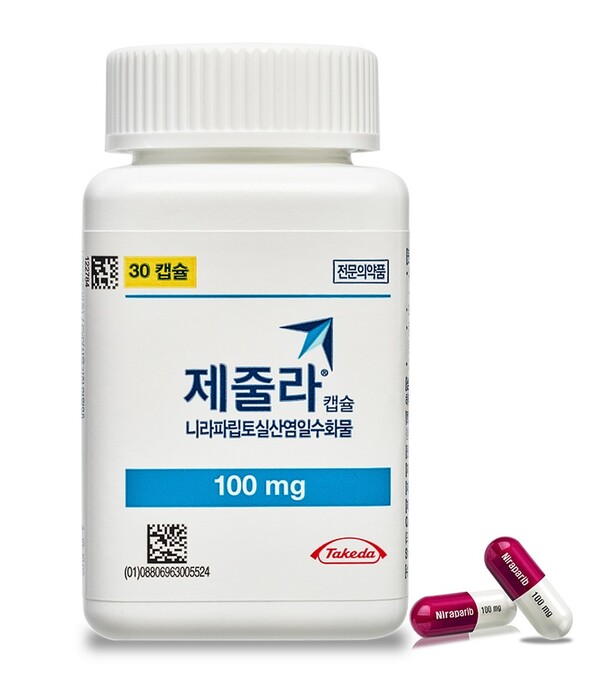Zejula (niraparib), Takeda Korea’s PARP inhibitor, recently saw its insurance benefits drop and its indication erased as the fourth or later treatment for ovarian cancer.
Last Monday, the Ministry of Food and Drug Safety deleted Zejula’s indication to “treat ovarian cancer for the fourth time or more.”

The ministry’s move was according to Takeda Korea’s decision to cancel the indication voluntarily. However, in a preemptive step, the Health Insurance Review and Assessment Service (HIRA) announced the payment criteria for Zejula’s monotherapy (fourth or more palliative therapy) on Dec. 28 and implemented it from Sunday.
Zezula was the only PARP (poly ADP-ribose polymerase) inhibitor in Korea that could be used to treat recurrent ovarian cancer. Therefore, due to the deletion of this indication, PARP inhibitors can now be used only for maintenance therapy in platinum-sensitive patients.
Zezula will likely be driven into a corner in the competition between PARP inhibitors due to the deletion of this indication.
Currently, there are two PARP inhibitors with an indication of ovarian cancer maintenance therapy in Korea -- Zejula and Lynparza (olaparib).
Between the two, Zejula was approved as an "all-comer" monotherapy as the primary and secondary or higher maintenance therapy for platinum-sensitive patients.
Lynparza was approved as the primary maintenance therapy of platinum-sensitive patients and as all-comer monotherapy for “BRCA-mutation” patients’ primary maintenance and secondary or higher maintenance therapy. It also won the nod as primary, platinum-based chemotherapy and as bevacizumab-combined therapy for HRD (homologous recombination deficiency)-positive patients who responded to bevacizumab combination therapy.
At first glance, Zejula seems to have an advantage as it was approved as an all-comer for primary and secondary maintenance therapy. Still, the reality is different, according to experts.
This is because the combo therapy of platinum-based chemotherapy and bevacizumab has become the standard treatment for ovarian cancer. Zejula can be used in the primary treatment of patients who received platinum-based chemotherapy in the primary treatment, so those who use bevacizumab cannot receive the treatment.
However, Lynparza can only be used for HRD-positive patients, who account for about half of the total. Therefore, the issue of selecting bevacizumab combo therapy remains in setting up a strategy for the primary treatment of HRD-negative patients.
Still, Lynparza’s strength will likely continue for the time being. That’s because Zejula’s indication for the secondary maintenance therapy has been reduced again from all-comer to germline BRCA (breast cancer) mutation patients in the United States.
GSK, which possesses Zejula’s sales right in the U.S., voluntarily reduced the secondary maintenance therapy at the request of the Food and Drug Administration (FDA) last November.
The move came after Zejula failed to prove overall survival (OS) improvement in the phase 3 clinical trial, the NOVA study, by recording an OS hazard ratio (HR) of only 1.06 in the BRCA mutation cohort group compared to placebo groups.
Accordingly, Zejula’s indications may be reduced again in Korea. Also, Zejula’s insurance benefits are likely to drop because it currently gets
Moreover, insurance coverage for all BRCA mutation patients, including BRCA mutation and somatic BRCA mutation for the secondary or higher treatment.
Moreover, the indications of Lynparza, the first PARP inhibitor, are far ahead of Zejula’s in all aspects.
Currently, Lynparza has indications for ovarian cancer, breast cancer, pancreatic cancer, and prostate cancer. Among them, prostate cancer indications passed the Cancer Disease Review Committee (Cancer Review) in April last year and are being reviewed for benefits.
Zezula will also likely expand its indication to prostate cancer the next time. However, Zezula's prostate cancer indication is a complicated issue because Janssen Korea has the sales right for its prostate cancer indication in Korea.
Therefore, the competitiveness of Zejula, a major anticancer drug pipeline, is also likely to weaken Takeda Korea by serving as a negative factor, according to industry analysts.

